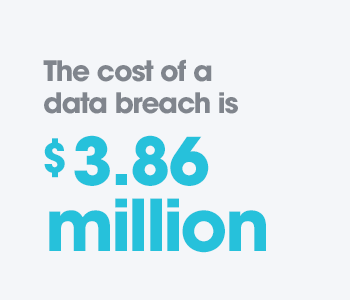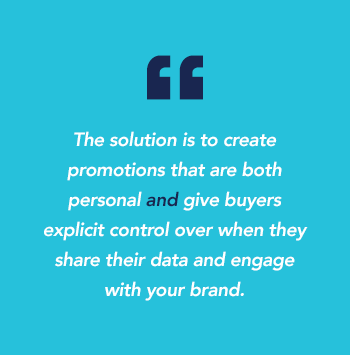Digital Marketers are faced with a troubling dilemma. According to our recent customer acquisition report*, 77% feel under more pressure this year to meet acquisition and revenue goals, and one in five say privacy concerns are the number one cause.
That may not seem like much of a bind, until you consider this: one of the most highly effective ways to acquire customers is through personalized marketing. But how can marketers do this without stoking privacy concerns and losing the trust of customers?
It puts marketers between a rock and a hard place. Is there a way out? Or will privacy concerns keep marketers from reaping the benefits of personalization?
Marketers are Surrounded by Privacy Challenges
The issue of consumer privacy is changing the marketing landscape and putting pressure on marketers from three angles:
1. Privacy Regulations
Concerns over consumer privacy protection are driving stricter government regulation. The EU General Data Protection Regulation (GDPR) requires marketers to proactively ask for consent before collecting or tracking a user under any identity, even an IP address. It also provides clear guidance on how a business must communicate with their customers once a breach has occurred.
In short, any company doing business with the EU must prove they have adequate data protection and be able to delete personal data if a customer asks them to. Non-compliance can be costly: $20 million or 4% of annual revenue, whichever is higher. Despite a great deal of media attention, the GDPR still caught many companies off guard: according to CompTIA, only 13% of firms said they were fully compliant with GDPR one month before regulations went into effect.


In the US, the state of California passed a similar law this year. And with the ongoing concern over online privacy getting increasing media scrutiny, more legislation could be on the way.
All this puts more pressure on marketers who want to create highly relevant, targeted campaigns, but now have to deal with limits on their previous sources of customer data and the very real risk of breaking unfamiliar and complicated laws.
2. Threat of Data Breaches
Hackers are relentless, and the threats (and risks) of data breaches are high. The Identity Theft Resource Center reported the number of data breaches jumped 29% in the first half of 2017, up from an all-time high of 1,093 in 2016.
They’re also expensive. According to IBM’s 2018 Cost of a Data Breach Study, the cost of a data breach rose 6.4% to $3.86 million – that’s $148 per lost or stolen record. Marketers’ lack of control over corporate data security only adds to the pressure they feel and the responsibilities they face.
3. Consumer Fear
A recent survey conducted by Kelton Global, a leading global insights firm, uncovered consumers’ latest attitudes and expectations about how they want brands to treat their data and communicate with them, particularly in light of the much-publicized Facebook data breach. The survey of 1,000 shoppers showed they:
- Are suspicious of companies: 73% believe brands use their personal information without their knowledge.
- Care about their PII: 83% have concerns with the type of data brands collect.
- Don’t like being surveilled: only 17% want brands using web tracking, and only 8% want brands using social media tracking.
Consumers are more guarded than ever before, and that’s just another hurdle marketers have to overcome.


All three privacy concerns erode consumer trust and make buyers less likely to purchase. And they pose a great challenge because at their core is the issue of how brands handle customer data — the lifeblood of every marketing campaign.
Is This the End of Personalization?
Every digital marketer knows that personalization drives results. Research shows that 78% of internet users say personally relevant content from brands increases their purchase intent.
And the results bear out: 88% of U.S. marketers reported seeing measurable improvements due to personalization. In fact, personalization can drive 5-8x ROI on marketing spend.
Buyers want marketers to make them feel unique without marketers learning about them covertly or sharing insight behind their backs. And companies worry about storing third-party data that new laws have made even harder to collect. Is this the end of the road?
Not quite. The solution is to create promotions that are both personal and give buyers explicit control over when they share their data and engage with your brand.
A New Approach for Consent-Based Marketing: Gated Offers
Gated offers are promotions designed to target members of a particular group based on their life stage, occupation or affiliation, such as seniors, teachers, students or the military. Here’s how they work:
- Companies invite customers to prove their eligibility for an offer.
- Customers who like the offer opt-in by providing their credentials to receive it..
- Digital verification instantly verifies customers’ eligibility.
- Customers enjoy the reward.
The beauty of gated offers is that brands can create a personalized promotion that appeal to a target segment, such as Urban Outfitters’ back-to-school discount for college students, and buyers get to decide if they want to opt-in to receive it.
Buyers like gated offers because they appeal to a sense of “tribal” belonging that makes them feel special. And marketers gain the advantage of personalization without concerns over violating privacy laws or customer trust.
It’s this win-win that’s making gated offers a growing trend among digital marketers. According to our customer acquisition survey, nearly 95% of marketers are interested in using, testing or learning more about gated offers in 2019.


Gated Offers Reduce the Pressure of Privacy Concerns
SheerID’s Digital Verification Platform uses hundreds of authoritative sources to instantly verify a customer’s eligibility for a gated offer. Gated offer programs implemented with SheerID address privacy concerns because they:
- Comply with privacy regulations. Buyers have to provide their consent to redeem the offer, which is what they want. Our research shows that, by a margin of 2:1, consumers want to be able to opt-in before brands can use their personal data.
- Reduce vulnerability to data breaches. When SheerID verifies eligibility for a gated offer, they hold the consumer data, which frees companies from any potential risks. Using SheerID also gives consumers what they want: 57% said they would rather be verified by a third-party than by a brand’s customer representative.
- Reassure consumers and builds trust. Gated offers verified with SheerID require only the personally identifiable information (PII) that people are most willing to give — email address, full name, and date of birth. And the opt-in process helps customers feel empowered because it puts them in control of their data sharing, and that helps facilitate brand loyalty.
Gated Offers Support Digital Marketing and Privacy
Gated offers help digital marketers reap the benefits of personalization while complying with privacy regulations and eliminating the risks of having to manage PII. And because gated offers are wildly popular — 94% of consumers would take advantage of one — they give marketers a powerful tool for acquiring and retaining high-value customers. That’s a winning combination that relieves the pressure on marketers and helps ensure their success.
Want to Learn More About the State of Customer Acquisition?
Our survey asked marketers about their challenges, acquisition strategies, spending plans and more. See what they had to say by downloading The State of Customer Acquisition: How Marketers are Confronting the Challenges of a Noisy Marketplace.
*SheerID partnered with WBR Insights to compile a new report: The State of Customer Acquisition: How Marketers are Confronting the Challenges of a Noisy Marketplace. We surveyed 150 leaders in customer acquisition across five different consumer-facing industries. Most respondents represent B2C companies generating $1 billion or more in annual revenue.







